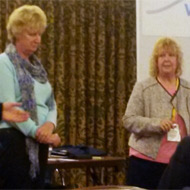
Updated PSS Scheme to launch November 2015
The new Practice Standards Scheme (PSS) is due to launch in November 2015, the RCVS have announced.
The PSS is a voluntary initiative to accredit veterinary practices in the UK. At present, 57 per cent of UK practices are registered to the scheme. Through setting standards and carrying out regular inspections, the scheme aims to promote the highest standards of veterinary care. In June 2013, the RCVS council approved the development of a new structure for the PSS.
In their VMPA session at the Celtic Manor Resort in Newport, Jacqui Molyneux, Practice Standards Group Chair, and Pam Mosedale highlighted key benefits of the new scheme which include a dedicated online IT system, a trained and professional inspectorate and the additional 'awards' which will be made available.
It is hoped that the new scheme will place a greater emphasis on behaviours and the factors that impact upon the veterinary care of animals. It also aims to provide practices with a clear pathway to improvement and delivers significant marketing benefits by allowing them to focus and promote the areas in which they excel.
The new IT system will provide a step-by-step guide to the requirements of the scheme and will allow practices to upload evidence prior to inspection. This will free up time on inspection day. The new IT system will also provide reminders, such as when practice insurance is about to expire.
There will be a much greater emphasis on training in the new PSS. The RCVS say that they will begin recruiting for assessors in early Spring and, in addition to Senior Assessor, there are likely to be 20 posts available. Extensive training will be offered in understanding inspections and using the new IT system.
Awards are to focus primarily on the behaviours, outcomes and other factors that impact upon the veterinary care of animals. Within each award, practices would be designated as "outstanding" or "good". There will be six awards for 'small animal', five for 'equine', and four for 'farm'. Within equine, there will be a new award for ambulatory service, where practices will be able to achieve "good" and "outstanding" without having any premises to take animals back to.
Upon launch, practices who are already registered will automatically join the new scheme at their current accreditation level. So far, feedback from focus groups has been positive, and the awards and IT system have been tested well.
A detailed consultation will be launched at the beginning of February.



 The Animal and Plant Health Agency (APHA) has updated its online reporting service for dead wild birds.
The Animal and Plant Health Agency (APHA) has updated its online reporting service for dead wild birds.